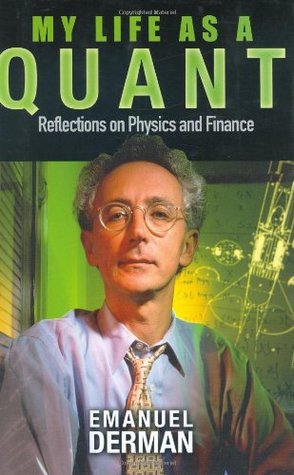My Life as a Quant Summary

4 min read ⌚

Reflections on Physics and Finance
A large portion of the population will easily agree that nowadays, it’s hard to find the “voice of reason” or guidance. Emanuel Derman sacrifices his privacy and shares some amazing insights and ideas that are definitely worthy of your time.
This book summary emphasizes the value of science and pinpoints some of the fundamental principles of Wall Street.
Who Should Read “My Life as a Quant”? And Why?
In general, open-minded persons would find it easier to navigate throughout the book, while in the meantime allow the Derman’s reminiscences to take the lead. Tackle your mind, and don’t tolerate its interference in this magnificent in-depth life story.
We sincerely recommend “My Life as a Quant” to all people with passion and desire to have a look at Wall Street practices and comprehend the links between science and economics.
About Emanuel Derman
 Emanuel Derman is a South-African born in 1945, Capetown. He is an author, businessman, a quantitative analyst and currently works at Columbia University as a director of the financial engineering program. It’s worth mentioning that Derman co-wrote the “Black-Derman-Toy” model.
Emanuel Derman is a South-African born in 1945, Capetown. He is an author, businessman, a quantitative analyst and currently works at Columbia University as a director of the financial engineering program. It’s worth mentioning that Derman co-wrote the “Black-Derman-Toy” model.
“My Life as a Quant Summary”
Physics call into question many theories and scientific discoveries presented in the past. By all means, science devises and explains our physical existence, which clarifies the primate – most revealing experimental branch. When we take into consideration the widely-known laws of physics like gravity, the nature of radio waves, the elements of electricity and others, we come to seeing that none of these are subjected to change.
As old concepts, they surely promote a sense of reliability and consistency, even in the Digital Age. As an end-product of extensive research and experiments, physicists put their hopes on the trustworthiness of these laws. The charisma of physics reached its peak with Einstein’s perceptive analysis linked to our inner nature.
You might be wondering – How is this related to economics? – Stay with us for more:
In fact, Wall Street appropriated many of these subtly conveyed ideas and merged them with the basics of economy and financial management. This method opened the gates of integrating two exceedingly different perspectives and consequently marked the beginning of a new era.
Here’s the deal:
Derman’s book has a lot to offer, alluding to all aspects of not just finance but consequences leading to disastrous outcomes. We can spend hours and hours trying to define science or economics and all branches associated with them, but we will only end-up trapped into our shallow knowledge and self-restricted perspective.
It’s inevitable to mention that science; not just physics are being more and more integrated into the financial field. This unintentional cooperation creates the new world, also known as the globalization of scientific fields. Unfortunately, there are still some conservative mindsets which deny the connection between these sectors.
Why Wall Street?
Wall Street companies strived for more cooperation with physicists because the nature of doing business and making deals – shifted over time. The critical factor to success is the level of sophistication being brought to the job or task. Wall Street knew the market’s intention and decided to implement a new strategy for increasing its fair share in the worldly economy. Driven by desire and prosperity, mostly brokers had a tough assignment to put all these elements together and create a union between science and finance.
Stay tuned, for the best part:
This one-of-a-kind autobiography covering the emotional journey of a fascinating individual explains why this book deserves to have a place on your bookshelf. The author conveys a message – filled with a heavy burden, inherent for a thoughtful man. Emanuel Derman is known for his impartial recollection of numerous endeavors, which deeply examine his conscience. Generally speaking, not many books can provide sincere, honest, and trustworthy insights related to “background” of Wall Street. The decency of “My Life as a Quant” extinguishes the fire of Wall Street.
Derman’s confessions about certain mistakes, and that theories sometimes don’t work as one would hope lays out his correct attitude towards life. Scientific discoveries or ideas about financial models may sometimes be needed to explain some term or theory indeed, but in most cases, the reader will fall in understanding these methods. So, don’t move beyond the basic understanding, make sure that everyone gets your point, is Derman’s way of thinking.
Key Lessons from “My Life as a Quant”
1. The cause-effect ratio
2. The Inner Call
3. Wall Street intentions
The cause-effect ratio
Surprisingly, a recently conducted study reveals that the relation between finance and science is also happening the other way around – vice versa. This revelation indicates that economics play a huge role in discoveries nowadays, and once again reveals the “cause-effect” relationship.
The Inner Call
As you move page by page, you’ll notice that change unfolds spontaneously on a personal and professional level within you. Many firms which stood behind their stance and denied any links existing between science and finance quickly collapsed. It’s not a rarity to find stats, or policies linked to Wall Street companies, but discoveries or insights that clarify how Wall Street makes decisions on a day to day basis is another thing.
Wall Street intentions
In reality, Wall Street is not at all, interested in matters linked to the forces of nature, or why we fall, rather than being lifted up once we jump off a cliff. All joking aside, the point is that very few individuals saw the purpose and benefits deriving from this association, referring to science and finance.
Like this summary? We’d Like to invite you to download our free 12 min app, for more amazing summaries and audiobooks.
“My Life as a Quant” Quotes
If you decide you don’t have to get A’s, you can learn an enormous amount in college. Share on X crashes are not randomly occurring lightning bolts; they are the consequence of the madness of crowds who are busy avoiding the last mania as they participate in what will turn out to be the current one Share on X A good quant must be a mixture, too—part trader, part salesperson, part programmer, and part mathematician. Share on X In this job you really need to know only four things: addition, subtraction, multiplication, and division—and most of the time you can get by without division! Share on XOur Critical Review
Well, probably this book will be a perfect choice for those who aspire to become theoretical physicists at some point in the future or to an academic with interest in the same sphere. Perhaps, the author should have placed more emphasis on the financial aspect and the links between them. Other than that, this a great “catch”.








